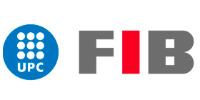To start the enrolment process for this programme you must complete and send the form that you will find at the bottom of these lines.
Next you will receive a welcome email detailing the three steps necessary to formalize the enrolment procedure:
1. Complete and confirm your personal details.
2. Validate your curriculum vitae and attach any additional required documentation, whenever this is necessary for admission.
3. Pay €110 in concept of the registration fee for the programme. This fee will be discounted from the total enrolment fee and will only be returned when a student isn't admitted on a programme.
Once the fee has been paid and we have all your documentation, we will assess your candidacy and, if you are admitted on the course, we will send you a letter of acceptance. This document will provide you with all the necessary information to formalize the enrolment process for the programme.
The Fundació Politècnica de Catalunya reserves the right to modify content, price, location, timetable and dates prior to the start of the course. Registration on the course will not be confirmed until payment has been made.
Registration rights. The interested party must make payment of the specified registration fee for the course. This fee will be deducted from the full course fee and will only be reimbursed if the applicant is not admitted.
Cancellation or deferment.The Fundació Politècnica de Catalunya reserves the right to cancel or defer a course if the minimum number of students is not met. In case of cancellation or non-admittance, the Fundació Politècnica de Catalunya will return all amounts paid in full, without any additional compensation. In case of deferment, applicants may request reimbursement of fees paid.
Cancellation of registration.
In the event of withdrawal or cancellation of the registration, the student must notify the UPC School in writing beforehand.
- If this request for cancellation is made 45 days before the start of the programme, the UPC School will retain only 30% of the total registration fee and refund the difference paid.
- In the event that the application request is made within 45 calendar days and the beginning of the programme, the UPC School will retain 60% of the registration fee.
- No applications for refunds may be made after the programme has started.
Under exceptional circumstances, refunds of the registration fee will be made if the student's cancellation is due to one of the following circumstances:
- Denial of a visa, subject to submission of supporting documentation. In this case, the UPC School will refund the registration fee less 300 Euros for administrative expenses.
- Serious illness or accident accredited by an official medical certificate, stating the start date of the illness and the anticipated convalescence period. In this situation the UPC School's decision will be as follows:
- If the notification takes place up to one month after the start of the programme, it will refund the amount actually paid, less 300 Euros as administrative expenses.
- No refunds will be made after a month after the start of the programme. It will be only be possible to use the amount paid as a deposit for the registration fee of the next programme. This procedure entails no administrative fee for the student. The price difference between the new registration fee and the amount previously paid will be payable by the student under all circumstances.
Changes in registration. Any changes in registration, previously authorised by the Fundació Politècnica de Catalunya, will incur a 300 € administration fee.
Discounts.
- Discounts are non-accumulable. The greater discount of those requested will be applied.
- Discounts can only be applied under prior application and approval.
- Once registration has been confirmed, no discount will be applied.
- Students are responsible for placing applications for any discounts.
Qualification. In order to obtain the Qualification/Diploma issued by the Polytechnic University of Catalonia, the student must be in possession of a recognised university qualification or internal university qualification equivalent to a degree or diploma. If this is not the case, the student will receive a certificate of completion for the course, issued by the Fundació Politècnica de Catalunya. Students with outstanding payments due to the Fundació Politècnica de Catalunya or who has not approved all the credits necessary to overcome the program before the date of completion of this program will not be eligible to receive any qualification, diploma or certificate.
Barcelona, October 31, 2017


